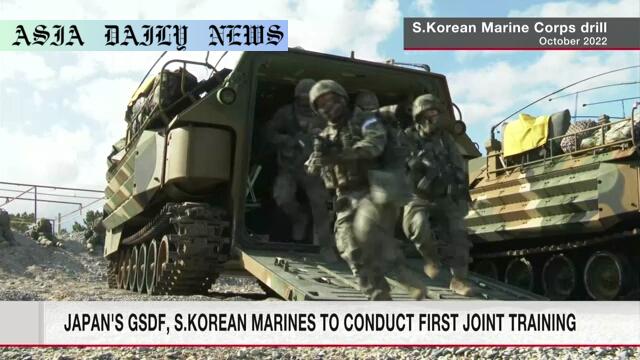Joint Training: Japan’s GSDF and South Korea’s Marines partner in their first-ever security exercise, focusing on tsunami rescue preparedness.
Japan’s GSDF and South Korean Marines join for the first-ever joint training exercise next month.
The exercise focuses on tsunami rescue efforts, improving multilateral cooperation and security preparedness.
This cooperation reflects efforts toward a free and open Indo-Pacific region.

Historic Joint Training Alliance Between Japan and South Korea
Japan’s Ground Self-Defense Force (GSDF) and South Korea’s Marine Corps will embark on a groundbreaking partnership as they conduct their first joint training exercise. The exercise, scheduled for early next month, signifies a pivotal step in deepening security cooperation in the region, primarily aimed at countering emerging threats such as those from North Korea. This collaboration underscores a new chapter of trust, cooperation, and shared responsibility in maintaining peace, especially amid increasing geopolitical tensions in East Asia.
Set within the framework of multilateral drills, the joint training will focus on disaster management and emergency response. Organized in the Philippines, these drills have historically operated seven times, but Japan and South Korea have previously participated separately. This marks a shift toward direct collaboration between these nations, highlighting a renewed focus on regional security and disaster preparedness. This exercise will uniquely feature South Korean Marines boarding GSDF boats for hands-on tsunami rescue training, emphasizing the critical need for seamless coordination in crisis scenarios.
Strengthening Security Ties to Promote Regional Stability
This unprecedented collaboration comes in the wake of a memorandum signed between the two nations’ defense ministers in July. The agreement centers on systematizing security cooperation, including intelligence sharing and joint exercises. Such initiatives are vital for nations with shared security challenges and territorial interests, fostering a sense of unity and alignment in defense strategies.
Both governments have expressed hopes that this joint effort will contribute to realizing a free and open Indo-Pacific. This vision is crucial in addressing challenges such as maritime security, territorial disputes, and disaster response—issues that require a united regional approach. For South Korea and Japan, whose relations have often faced historical and political strains, this exercise serves as a significant step in bolstering bilateral trust and collaboration.
A Foundation for Future Regional Initiatives
The inclusion of the joint Japan-South Korea initiative in larger multilateral exercises creates a foundation for future collaboration on a regional and multilateral scale. By aligning their capabilities during this exercise, both nations can ensure that their defense forces are prepared to act swiftly and efficiently during disasters. Furthermore, this training is a message to the international community that regional powers are strengthening their partnerships to uphold global stability and counter adversarial influences.
While this alliance is an essential milestone, it also has broader implications beyond defense. Cooperation between South Korea and Japan could spill over into areas such as trade, technology, and energy. Building on shared values and goals, stronger ties between these nations can influence the broader Indo-Pacific strategy and align with global efforts to counter rising military threats in the region.
Commentary
A Remarkable Step Toward Unified Defense
The joint training between Japan’s GSDF and South Korea’s Marine Corps is a truly remarkable milestone. This exercise not only underscores the importance of collaboration in response to an era of heightened regional threats but also reflects the strides these nations are making to overcome historical obstacles for the shared benefit of regional security. As someone who has followed developments in East Asian geopolitics, I find this move both necessary and inspiring.
Bridging Past Conflicts
Japan and South Korea’s relationship has often been strained by historical grievances and political disputes. However, this exercise signals that the two nations are prioritizing common security goals over historical tensions. This is encouraging because maintaining peace in the Indo-Pacific requires collaboration and mutual understanding among key regional players. Such exercises could help establish a sense of camaraderie between their armed forces, which lays the groundwork for more extensive collaborations in the future.
Lessons for the Broader Region
This joint effort also provides an excellent example for other nations in the Indo-Pacific region. It emphasizes that even countries with challenging histories can overcome their differences when global stability is at stake. Disaster preparedness, intelligence sharing, and joint military training reinforce the idea that regional challenges should be met with collective solutions. Moving forward, it will be exciting to see if these partnerships expand to include other nations, fostering a networked approach to facing environmental and geopolitical challenges.
Future Implications
As we ponder what lies ahead, this historic collaboration reflects a shift in the geopolitical landscape of Asia. While keeping a watchful eye on adversarial threats, regional allies like Japan and South Korea are sending a strong message of unity. This exercise is a major confidence booster, instilling hope for a more secure and cooperative future. I am optimistic that such initiatives pave the way for stronger defense partnerships and a more resilient Indo-Pacific region.


